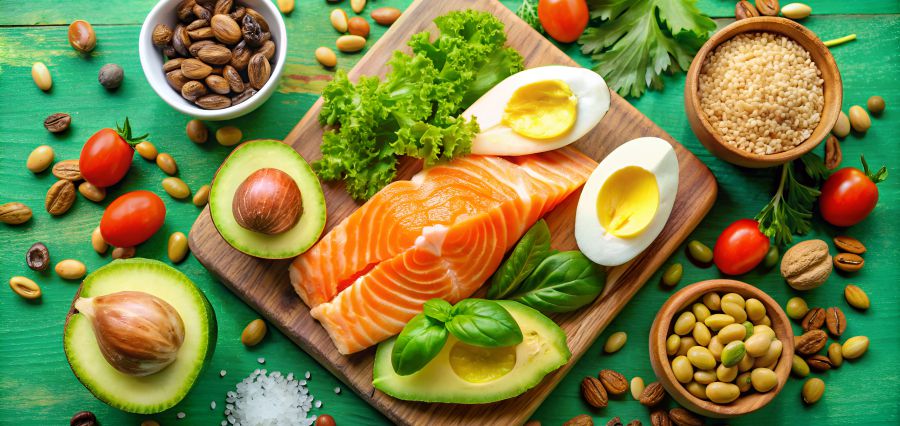The ketogenic diet, widely known as the keto diet, has long been utilized to manage epilepsy, particularly in children who do not respond to conventional treatments. However, its contemporary application as a weight loss strategy gained traction in the late 20th and early 21st centuries.
This diet transitions the body into a state of ketosis, allowing it to burn calories derived from protein and fat instead of carbohydrates. When adhered to correctly, it promotes swift weight loss, diminishes disease risks by lowering insulin and cholesterol levels, and improves mental clarity. (1)
The keto diet emphasizes a high intake of healthy fats, a moderate amount of protein, and minimal carbohydrates. Below are some of the top foods to incorporate into your ketogenic lifestyle: (2.3)
1.Avocados
Avocados stand out as one of the few fruits permissible on the ketogenic diet, valued for several reasons:
- Rich in fats and fiber, avocados only contain 17g of carbohydrates.
- Packed with essential nutrients and vitamins.
- Enjoyable in salads, smoothies, or simply on their own.
- Studies indicate that regular avocado consumption can lower cardiovascular disease risk. (4)
- They also contribute to satiety, aiding in calorie control.
2.Meat and Poultry
- Options like chicken, beef, and turkey are high in protein and fat, while being low in carbohydrates, making them perfect for the keto diet.
- They are also rich sources of vital minerals and vitamins, such as B vitamins and omega-3 fatty acids.
- These foods promote general health by aiding tissue repair, bolstering immunity, and supporting muscle maintenance during the diet.
3.Fish and Seafood
- Fish, including salmon and other seafood, are essential to the keto diet due to their high levels of vitamin D and omega-3 fatty acids.
- These options are high in protein and low in carbohydrates.
- Seafood also offers anti-inflammatory benefits for heart health, enhancing overall wellness.
4.Nuts and Seeds
- Nuts such as almonds and walnuts, in addition to various seeds, are not only tasty but also rich in fiber, protein, and healthy fats.
- Nevertheless, they are calorie-dense, so consumption should be moderated.
5.Eggs
- Eggs are nutrient-dense and keto-friendly, being high in fats and proteins while low in carbohydrates.
- They also contain significant antioxidants and vitamins, including choline, which is beneficial for brain health.
- Prepared in numerous ways, eggs can be paired with other keto-approved ingredients, such as cheese.
6. Coconut oil and MCT oil
- Medium-chain triglyceride (MCT) oil, coconut oil, and olive oil are staples in the ketogenic diet due to their abundance of healthy fats.
- These oils provide energy and facilitate the transition into ketosis.
- Coconut oil can be utilized in cooking or added to coffee for enhanced flavor.
While the ketogenic diet offers numerous advantages, it should be approached with caution and not undertaken without medical supervision. This diet is typically recommended only for a limited duration, as it may lead to nutritional deficiencies, the “keto flu,” digestive disturbances, or heightened heart-related risks.
References
- https://www.webmd.com/diet/ss/slideshow-ketogenic-diet
- https://www.healthline.com/nutrition/ketogenic-diet-foods#animal-proteins
- https://zoe.com/learn/what-foods-can-you-eat-on-the-keto-diet
- https://www.ncbi.nlm.nih.gov/pmc/articles/PMC4330060/
Read More : Click here






